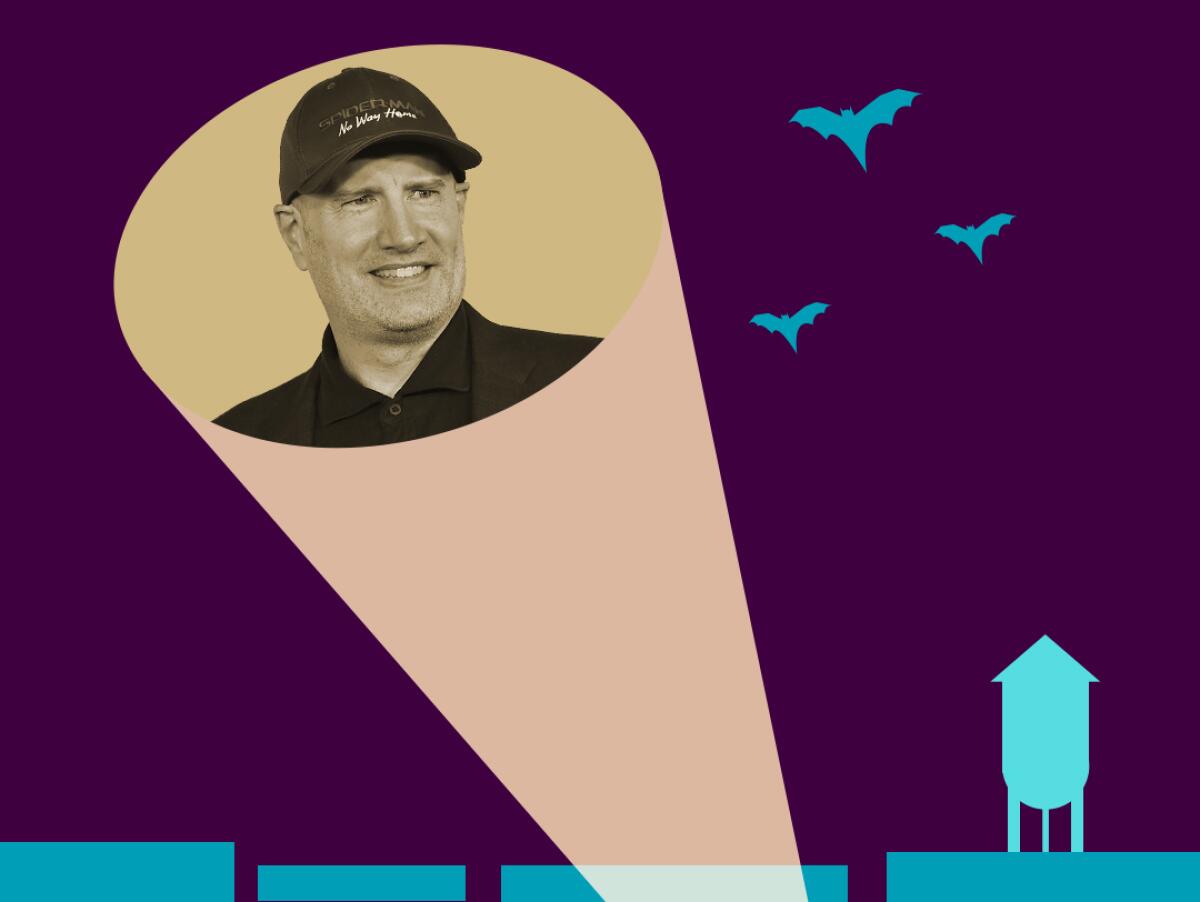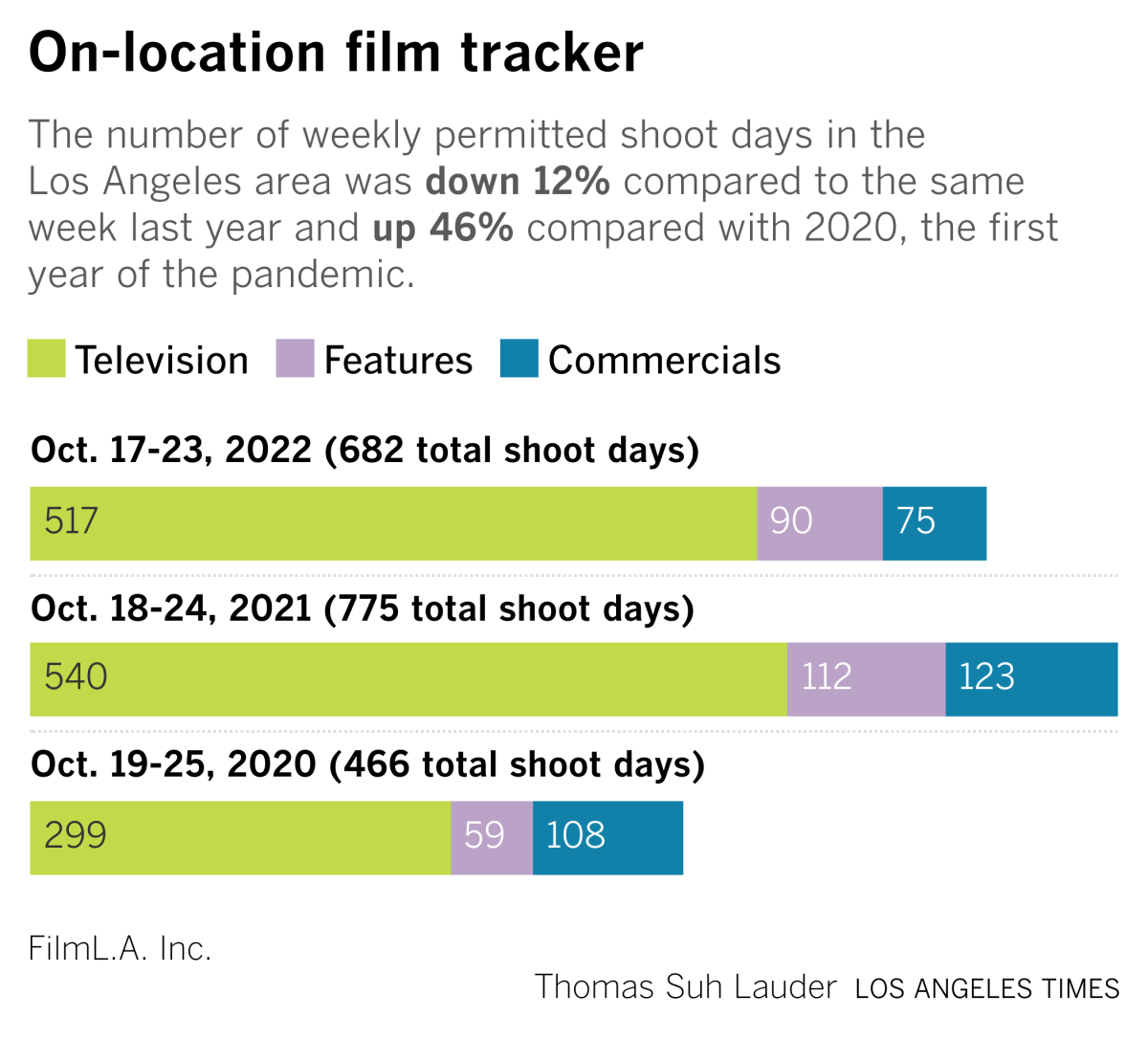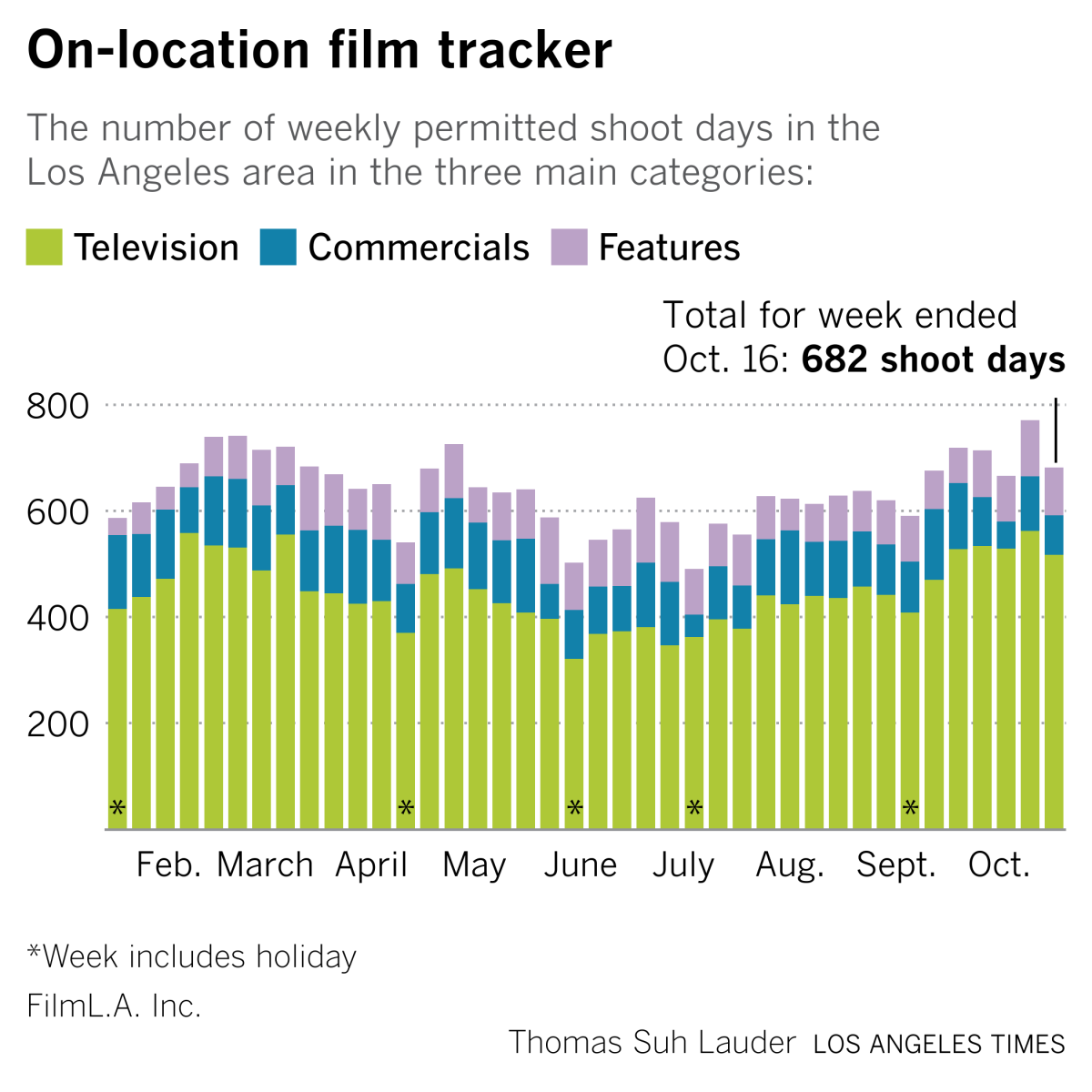Wide Shot: Does DC need a Kevin Feige? Does Netflix need theaters?

Welcome to the Wide Shot, a newsletter about the business of entertainment. Sign up here to get it in your inbox.
Ted Sarandos’ comments last week downplaying the significance of a plan to briefly release “Glass Onion: A Knives Out Mystery” in theaters struck a sour note with some cinema operators. Many had thought that the Rian Johnson film’s one-week theatrical release, coming a month before it hits Netflix, was supposed to be an experiment that could lead to a greater embrace of the theatrical experience by the streamer.
But the Netflix co-chief executive spun the big-screen initiative as more of a marketing ploy, akin to its film festival premieres, than a potential new business opportunity.
“We are in the business of entertaining our members with Netflix movies on Netflix,” Sarandos said, while acknowledging debate within the company over just that question. There have been many who’ve argued that Netflix would benefit both from the additional revenue and sense of legitimacy that comes with the box office.
Sarandos sent a strong signal that Netflix is not about to make a 180 on theatrical releases any time soon, even after the company decided to get into the advertising business, another onetime non-starter. The marketing costs are too high, the risks too great. But as is often the case with Netflix’s seemingly rigid ways in other areas, these hurdles are insurmountable until they aren’t.
Elsewhere in the business of entertainment, a ridiculous number of people listened to Taylor Swift’s new album, Apple is raising prices for streaming, HBO‘s “House of the Dragon” finale drew 9.3 million viewers, Kevin Spacey won a sexual misconduct trial, and Warner Bros. Discovery is doing “Lord of the Rings” NFTs.
Finding a Feige
Speculation over the state of the DC franchise — and who might run it for Warner Bros. Discovery — entered the Speed Force last week amid the long-expected exit of Walter Hamada, the executive responsible for the superhero films since 2018.
All the angst over the state of Batman, Superman and their ilk comes despite the movies doing pretty well during the last four years. “Aquaman,” “Shazam!,” “Joker” and “The Batman” were all successful. “Birds of Prey,” though, was a box office disappointment, and “Wonder Woman 1984” and “The Suicide Squad” were hamstrung in theaters by their simultaneous releases on HBO Max during the studio’s experimental COVID-19 “Project Popcorn” era.
The latest big DC effort, last weekend’s “Black Adam,” starring Dwayne Johnson, opened at No. 1 with $67 million in the U.S. and Canada. Not exactly gigantic, considering its $195-million production budget and substantial marketing costs, but not bad at all for a violent antihero almost no one had ever heard of. The domestic opening ended up meeting expectations and landing in the ballpark of the first “Thor,” “Captain America: The First Avenger” and “Aquaman.” Much will depend on how “Black Adam” holds in subsequent weekends both at home and internationally, and there’s not much competition until “Wakanda Forever” debuts next month.
But the questions about DC are not necessarily all about recent performance. They’re about the strategy for the next few years.
In an attempt to catch up with Kevin Feige at Marvel and Disney, DC tried to build an extended universe too quickly, betting on the vision of Zack Snyder after 2013’s “Man of Steel.” But poor creative decisions and second-guessing got in the way, and “Justice League,” which was supposed to be DC’s “Avengers,” was a disaster for the studio and for fans.
As a result, Warner Bros. backed away from universe-building and continued the parts of the Snyderverse that were working (who wouldn’t greenlight another “Aquaman”?). Otherwise, it just tried to make individual movies based on the I.P. without worrying too much about making a coherent juggernaut of a franchise. After all, Marvel started off by just making hits like “Iron Man.” Only then did it make sense to pursue much larger ambitions.
The result is that there are now multiple disparate timelines for the DC movies and television shows. “The Batman” is getting a sequel with Robert Pattinson, continuing Matt Reeves’ noir take on the Caped Crusader. “Joker” has its own Scorsese-adjacent thing going on, with the sequel planned as a musical with Lady Gaga. All the while, “Black Adam” has clear ties with the universe Snyder set up due to the worst-kept secret cameo in the business, leading to Henry Cavill announcing his return to the role of Superman.
All of those individual parts, including the HBO Max spinoff shows, can be successful without coming together as a coherent whole.
“There’s a lot of risk-taking being done that maybe DC hasn’t gotten full credit for, but there are also movies that still exemplify why there isn’t a cohesive vision,” said Shawn Robbins, chief analyst at Box Office Pro. “It’s fascinating to see how these different universes live inside of the broad DC spectrum.”
Which brings us to the leadership of DC and David Zaslav’s Marvel-envy. The Warner Bros. Discovery chief has told investors he’s embarking on a 10-year plan for the series modeled after Disney’s most successful studio, while also slashing and burning through the company and axing DC’s “Batgirl” movie. Zaslav wants his own Feige to run DC as part of a trifurcated leadership structure where Michael De Luca and Pamela Abdy steer live action non-super hero movies and another executive-to-be-named leads animation.
Finding that person for DC has proved challenging. The company was in discussions with Dan Lin, known for producing on Warner Bros.’ “Lego” and “It” movies, but talks fell apart. Anyone who comes in would be challenged by a monumental task and constant comparisons with Feige’s singular success rate, the result of a uniquely thorough understanding of the comic book source material.
Plus they would parachute into a dicey PR situation with “The Flash,” starring Ezra Miller, who brings the baggage of his arrests and a felony burglary charge. Meanwhile, the Rock, during the “Black Adam” press tour, has been making public statements about the importance of listening to the fans.
Within Warner Bros., some folks are increasingly convinced that the studio needs a single executive to direct traffic for all three branches rather than have duties split between live action, DC and animation without another layer between them and Zaslav. De Luca is already effectively serving in that role alongside Abdy until the company finds someone specifically for DC, which is still the plan, according to people familiar with the matter.
DC has lately been solid, though not as powerful as it could be. Batman and Superman ought to be the envy of Hollywood. Someone like Feige can build a dynasty from heroes like Iron Man who were seen as minor leaguers at the time. There simply aren’t many Feiges out there to pick from.
Warner Bros. representatives had no comment.
Stuff we wrote
— Who is Danny Bakewell, the Black L.A. power broker named in the Nury Martinez audio? Brian Contreras examines Martinez’s brief references to Bakewell, a high-profile leader among Black Angelenos, real estate developer and the executive publisher and owner of the Los Angeles Sentinel, the long-running Black newspaper.
— ‘Rust’ shooting, one year later. We lay out Hollywood’s broken promises to make sets safer after the deadly accident, including moves to ban real firearms on set that truly went nowhere. What’s changed and what hasn’t? Also: On the anniversary of Halyna Hutchins’ death, New Mexico D.A. warns that “no one is above the law.” There have still been no charges in the case, and the “Rust” team is looking to restart filming next year, possibly in California.
— Kanye West fallout. The rapper continues to lose business over his antisemitic comments. Now his agency, CAA, has dropped him. Here’s a rundown.
— Netflix wants to be a player in gaming. Can it succeed? Netflix believes games are the future, but after Google bowed out of the medium, should developers be wary? Todd Martens and Wendy Lee explore.
— ICYMI. What to know about Parler, the platform that Kanye West plans to buy. Amazon’s Prime Video gets exclusive rights to NFL ‘Black Friday’ game in 2023. Some good news for Netflix, with subscriber gains in the third quarter.
Number of the week

Snapchat owner Snap Inc.’s earnings provided a window into the state of the digital advertising market and what investors saw wasn’t inspiring. Shares of the social video app maker fell 28% Friday after the company reported revenue of $1.1 billion, missing expectations and marking its slowest sales growth ever. Snap expects sales to continue to decelerate.
The Santa Monica-based firm blamed multiple factors for its slowdown:
- App store policy changes (e.g., Apple).
- A pullback in advertising from brands worried about inflation and possible recession.
- Greater competition (i.e., TikTok).
To be clear, sales at the company are growing, just not as quickly as executives or investors want. But Snap executives acknowledged that its users are watching fewer videos posted by their friends and spending more time viewing content from others, putting it in more direct competition with TikTok. That’s simply a tough place for a social media company to be right now.
Best of the web
— James Corden is out, Anne Hathaway is in. But the biggest hypocrite is us (Los Angeles Times)
— I’m with the brand! How merch saved the music industry (The Guardian)
— Kylie Jenner’s private jet is bad for the climate. It’s far worse for the residents of Van Nuys (LAT)
— Taylor Swift and the return of the pop star album rollout (Vulture)
— Hitting close to home: Are we past peak newsletter? (New York Times)
Films shoots
Early in the pandemic, studios had to catch up for months when production was shut down and they were competing for hot new content. Now production volume is easing, Anousha Sakoui reported.
The total number of shoot days dropped 10.5% to 9,066 between July 1 and Sept. 30 from the same period in 2021, according to a new report from FilmLA, the nonprofit group that handles film permits for the city and county. The most notable declines were seen in feature films and commercials, with activity running below five-year averages.
The slowdown comes after a glut of productions getting up to speed after the pandemic. Now things are settling down. Hollywood’s recent cost-cutting may also be contributing to the dropoff.
We’ve been noticing in our weekly film-tracker charts that shooting volume has been running behind 2021 levels for some time. Here’s the latest: Last week’s count was down 12% from the same time last year.


Finally ...
Seeing Death Cab for Cutie at the Greek Theatre last week really brought out the elder millennial in me. The indie-pop band’s latest album, “Asphalt Meadows,” is legitimately good. If you want something with a little more bite (okay, a lot more...), hardcore band Mindforce has a new album that’s about 17 minutes of guitar-driven fury.
Inside the business of entertainment
The Wide Shot brings you news, analysis and insights on everything from streaming wars to production — and what it all means for the future.
You may occasionally receive promotional content from the Los Angeles Times.




